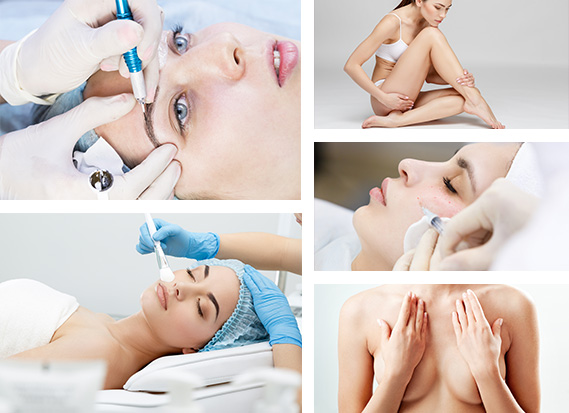WHAT IS AESTHETIC MEDICINE?
![]()
Why aesthetic medicine?
At a time when we are all brought increasingly face to face with our own images and those of others, we all want to feel good about ourselves and happy when we look in the mirror. To correct our flaws or fight the signs of ageing, advances in aesthetic medicine now give us access to new and effective techniques that do not necessary involve hospitalization and that allow us to return quickly to our social lives.
Aesthetic medicine or aesthetic surgery?
Both terms are very widely used in everyday parlance, but we think it would be worthwhile to review the differences between the two. Aesthetic medicine encompasses all the aesthetic acts and procedures that are usually carried out at a medical practice or an outpatient clinic (meaning with just a few hours of hospitalization). Conversely, aesthetic surgery concerns a more involved procedure performed by a surgeon with anaesthesia and hospitalization.


For all ages
Current trends point in part towards a gradual approach yielding more natural results and in part towards aesthetic procedures that may occur very early on to correct flaws on the face or body. As early as adolescence, acne scars can be erased. From the age of 20, the nose can be redone and laser hair removal is possible, as are cellulite treatments. At 30, some women begin to lose volume in the oval shape of their faces or start to have more pronounced wrinkles. From 40 years onwards, the balance of the skin’s barrier weakens. Cells can be stimulated to generate more collagen, but also to reduce forehead wrinkles and crow’s feet, fill in wrinkles and hollows in the face, and improve the skin’s texture. Next, around the age of 50 to 55, the decline in hormonal secretions intensifies the loosening of the skin. Aesthetic medicine is effective in erasing brown spots, reducing wrinkles and replumping the face.
At any rate, it is important to take the time to carefully consider what you want to “correct” before making any decisions. These changes are about the betterment of your skin, not a complete transformation. Today, physicians and surgeons are fully aware of the psychological stakes and can answer the questions of patients who are looking for tangible, natural results. Shortening the time during which the traces of the aesthetic procedure are too visible to go out in public is another major challenge addressed by aesthetic medicine, and a challenge for which CEBELIA works with the medical profession on a daily basis.
Cosmeceutical treatments, essential complements to any procedure
All aesthetic medical procedures have repercussions on the skin’s balance. At CEBELIA, our global approach to beauty can effectively supplement any aesthetic medical procedure with cosmeceutical skincare. During the pre-op stage of certain interventions, it is important to prepare the skin fully so that it can ramp up its natural defences. Post-op, very short-term skincare can produce spectacular results when it comes to offsetting adverse side effects (like overheating, irritation, bruising, swelling, etc.) and accelerating the disappearance of marks left behind by the aesthetic procedure. In the medium term, skincare enhances the medical act and reinforces its beneficial effects.
Cosmeceutical treatments, essential complements to any procedure
All aesthetic medical procedures have repercussions on the skin’s balance. At CEBELIA, our global approach to beauty can effectively supplement any aesthetic medical procedure with cosmeceutical skincare. During the pre-op stage of certain interventions, it is important to prepare the skin fully so that it can ramp up its natural defences. Post-op, very short-term skincare can produce spectacular results when it comes to offsetting adverse side effects (like overheating, irritation, bruising, swelling, etc.) and accelerating the disappearance of marks left behind by the aesthetic procedure. In the medium term, skincare enhances the medical act and reinforces its beneficial effects. 
